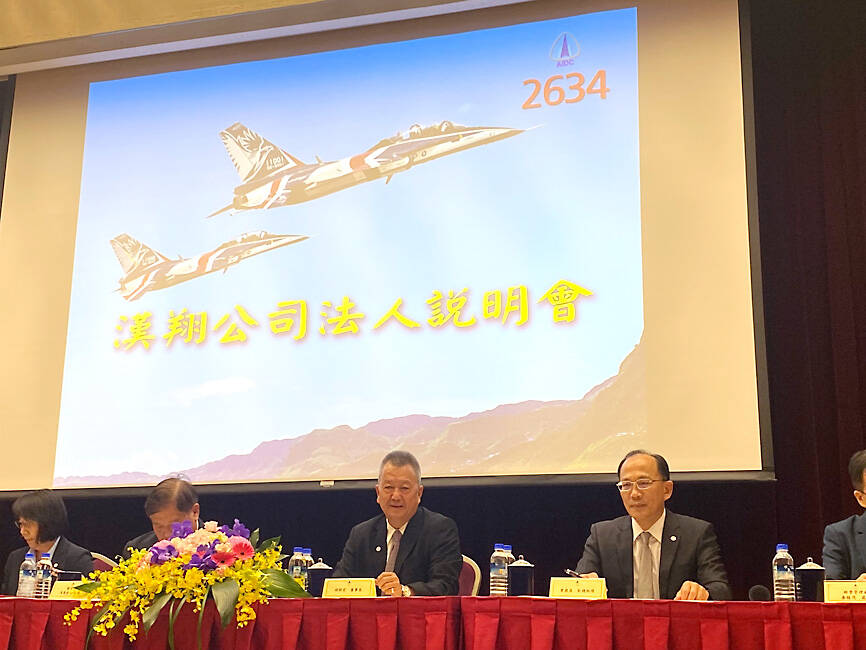Shares in Aerospace Industrial Development Corp (AIDC, 漢翔航空) yesterday surged by the 10 percent daily limit after the military aircraft manufacturer laid out a bullish outlook amid rising threats from China.
AIDC expects revenue and earnings per share to reach a record high this year due to demand from the defense industry and a rebound in the global air transport market, AIDC chairman Hu Kai-hung (胡開宏) said in an interview on Tuesday.
The company’s sales have grown 43.31 percent over the first seven months of this year, compared with the same period a year earlier, to NT$22.74 billion (US$712.27 million).

Photo: CNA
Net profit in the first half of this year rose 61.72 percent year-on-year to NT$1.3 billion, or earnings per share of NT$1.38, company data showed.
AIDC shares have surged 65 percent this year so far, outperforming the benchmark TAIEX’s 17 percent gain.
Taiwan faces increased pressure to fend off daily Chinese incursions across the median line of the Taiwan Strait, a tacit barrier that has separated the two rivals for decades.
Taipei is to raise its total defense spending to a record NT$606.8 billion, accounting for about 2.5 percent of GDP, a statement released on Monday by the Presidential Office said.
The partly state-backed Taiwanese company is aiming to deepen ties with Lockheed Martin Corp and other system suppliers over F-16 maintenance in an effort to bolster the nation’s defense capabilities.
The F-16 Maintenance and Support Center in Taichung, set up in 2020 with the help of the two companies, has significantly reduced the repair time needed for the air force, with some jobs previously taking as long as years, Hu said.
He declined to give details about how much time or cost the center has helped save over the years due to confidentiality.
“Deepening localization of maintenance is [a] top priority of the industry and the country” in response to rising tension across the Strait, Hu said. “This increases fighter jets’ availability, enhances technology and expands business for Taiwan’s industries.”
The F-16 maintenance center only serves the air force, but AIDC hopes it would one day handle orders from Lockheed Martin for fighter jets from elsewhere, Hu said.
The move would further integrate Taiwanese suppliers into the supply chain of the US company with more technology transfer, he added.
AIDC has received more than NT$50 billion of orders for commercial products in the first half of this year, including a 10-year contract of more than NT$35 billion to provide engine components to GE Aerospace. It also expects to deliver 66 trainer jets for Taiwan’s military by 2026, including 17 jets for this year.
Additional reporting by staff writer

Intel Corp chief executive officer Lip-Bu Tan (陳立武) is expected to meet with Taiwanese suppliers next month in conjunction with the opening of the Computex Taipei trade show, supply chain sources said on Monday. The visit, the first for Tan to Taiwan since assuming his new post last month, would be aimed at enhancing Intel’s ties with suppliers in Taiwan as he attempts to help turn around the struggling US chipmaker, the sources said. Tan is to hold a banquet to celebrate Intel’s 40-year presence in Taiwan before Computex opens on May 20 and invite dozens of Taiwanese suppliers to exchange views

Application-specific integrated circuit designer Faraday Technology Corp (智原) yesterday said that although revenue this quarter would decline 30 percent from last quarter, it retained its full-year forecast of revenue growth of 100 percent. The company attributed the quarterly drop to a slowdown in customers’ production of chips using Faraday’s advanced packaging technology. The company is still confident about its revenue growth this year, given its strong “design-win” — or the projects it won to help customers design their chips, Faraday president Steve Wang (王國雍) told an online earnings conference. “The design-win this year is better than we expected. We believe we will win

Chizuko Kimura has become the first female sushi chef in the world to win a Michelin star, fulfilling a promise she made to her dying husband to continue his legacy. The 54-year-old Japanese chef regained the Michelin star her late husband, Shunei Kimura, won three years ago for their Sushi Shunei restaurant in Paris. For Shunei Kimura, the star was a dream come true. However, the joy was short-lived. He died from cancer just three months later in June 2022. He was 65. The following year, the restaurant in the heart of Montmartre lost its star rating. Chizuko Kimura insisted that the new star is still down

While China’s leaders use their economic and political might to fight US President Donald Trump’s trade war “to the end,” its army of social media soldiers are embarking on a more humorous campaign online. Trump’s tariff blitz has seen Washington and Beijing impose eye-watering duties on imports from the other, fanning a standoff between the economic superpowers that has sparked global recession fears and sent markets into a tailspin. Trump says his policy is a response to years of being “ripped off” by other countries and aims to bring manufacturing to the US, forcing companies to employ US workers. However, China’s online warriors